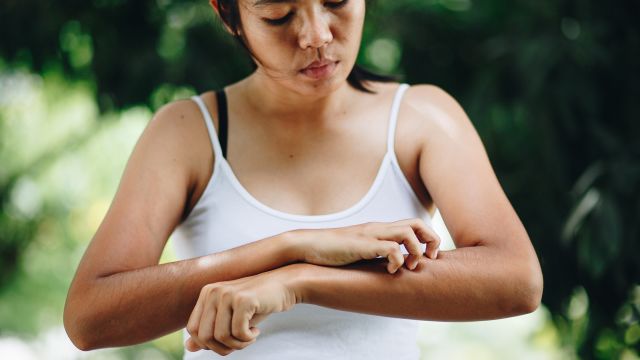Updated on January 8, 2025.
When the red, itchy patches of psoriasis flare up, it interrupts daily life until you can get your symptoms under control. We know genetics plays a role in psoriasis, but you can’t change your genes. Knowing and learning what triggers your flare-ups, however, can empower you to do what you can to avoid them.
“Psoriasis results from a combination of genetics and the environment,” said Alex Ortega-Loayza, MD, an associate professor of dermatology at Oregon Health & Science University in Portland. If you can learn the environmental factors triggering your psoriasis, it could help you prevent flare-ups or reduce your symptoms’ severity.
Take steps to manage stress
It’s no surprise that stress can trigger psoriasis flare-ups. Worse, it becomes a vicious cycle. The flare-up causes more stress, which worsens symptoms, and so on. Since you can’t avoid daily stress completely, develop stress management strategies that work for you. Three of the best are physical activity, practicing meditation, and getting a good night’s rest.
Physical activity not only relieves stress but also boosts your overall health. Any type of exercise can help, including walking, gardening, cleaning, biking, and even vacuuming. Meditation practices can also bring about greater emotional and physical well-being. Most types of meditation will help, including mindfulness meditation, visualization meditation, or guided meditations using an app.
And be sure you’re getting enough sleep each night. Most adults need about seven to nine hours a night. Lack of sleep or lack of quality sleep can have negative effects on your ability to focus, your energy levels, and your mood, among other things.
Try to maintain a healthy weight
Research has shown that weight gain and obesity are associated with a higher risk and greater severity of psoriasis. “Obesity increases the inflammatory state, and that might trigger other medical conditions,” Dr. Ortega said. “When patients are obese, they are sometimes more resistant to treatments as well,” he added.
When patients lose weight, their psoriasis often improves, Ortega said. Research backs him up. A 2022 review published in the International Journal of Molecular Sciences found that there is a great deal of research linking a higher body mass index (BMI) to psoriasis as well as psoriasis severity. There have also been many studies showing that flares can be helped with weight loss and exercise.
Research is still needed to know how effective bariatric surgery is at lowering psoriasis symptoms, but some studies suggest surgical weight loss can significantly reduce symptoms in some patients. Losing weight can be tough, but slowly improving your diet and being more physically active pays off even if you don’t reach your perfect weight.
Soothe dry skin
Keeping your skin moisturized may not prevent skin plaques, but thick creams, ointments, and even oils may help prevent and relieve itching, one of psoriasis’s most unbearable symptoms, according to the National Psoriasis Foundation. Moisturizers are even more effective if you use products with salicylic acid, lactic acid, urea, or phenol that soften the scaliness of skin plaques and reduce cracking and flaking. When the plaques are softer, they may be able to more effectively let through topical medications like corticosteroids, if your healthcare provider (HCP) prescribed those to you.
Still itching? The American Academy of Dermatology Association recommends using a cold washcloth on the skin and skipping long showers, as long periods of time spent in the water can dry out the skin. Over-the-counter products that treat itching and contain camphor and menthol tend to be most effective for psoriasis itching. But keep in mind: these products affect people differently and may worsen symptoms in some people.
And if you’re itchy, it’s tempting to scratch, but reach for moisturizer instead.
Seek help to quit smoking
“People who are smoking are more prone to develop psoriasis with the appropriate genetic background,” Ortega said. Smoking can also make a person’s psoriasis symptoms more severe. And this can be a two-way street. Psoriaisis may contribute to stress as well as anxiety or depression, and some people may cope with these uncomfortable feelings by smoking, worsening their condition.
People with psoriasis who smoke are also at risk for developing psoriatic arthritis. Quitting smoking is worth it, and while it may not make psoriasis go away, it may reduce flare-ups and protect you from other health issues.
If you need help to quit smoking, talk to your healthcare provider (HCP) about strategies proven to be safe and effective.
Your diet may play a role
There are many foods that can trigger inflammation, and while each person has different food triggers, there are some that are reliable. Fatty foods and highly processed foods can cause inflammation within body fat, and if this goes on for a while, it can increase a person’s risk of developing psoriasis as well as other serious chronic health conditions.
Alcohol, dairy products, refined carbohydrates (like white rice, pasta, and white bread), foods with saturated fats (like fast food, red meat, and cheese), and foods high in sugar (including fruit sugar) are all important to avoid. Some people also find that gluten triggers inflammation. If you are working on adjusting your diet, collaborate with your HCP to keep track of your symptoms and trigger foods.
The key components of a healthy diet for people with psoriasis include eating more whole foods and grains, vegetables, olive oil, beans, lentils, nuts and seeds, and lean protein like fish, tofu, and tempeh. The Mediterranean diet is often pointed to as the most evidence-based healthy diet for lowering chronic inflammation in the body.
Ongoing research is taking a closer look at gut microbiota and its possible relationship to psoriasis. If positive links can be found, then changing diets and even taking probiotics may prove very useful. For now, more research is needed.
Be mindful of changing seasons and weather
Changes in the seasons can trigger or weaken psoriasis symptoms, said Doris Day, MD, a dermatologist with NYU Langone Health in New York City. “Some find their psoriasis is worse in the summer,” Dr. Day said. “Others have it worse in the winter and find that sunlight helps reduce skin lesions.”
You can’t control the seasons or weather, but you can be prepared when new seasons arrive and use the sunlight if it helps. Be sure to keep sunlight exposure to small amounts to protect your skin from damage—avoid tanning or getting burned.
Focus on what you can control
Just like you can’t control the seasons and your genetics, you can’t control all possible psoriasis triggers. So, focus on what you can control. “Maintain a great skin care regimen, use a great moisturizer twice a day, manage stress as well as you can, get a good night's sleep, and eat as healthy a diet as possible,” Day said. “Weight management and quitting smoking if you're a smoker are also very important.”







